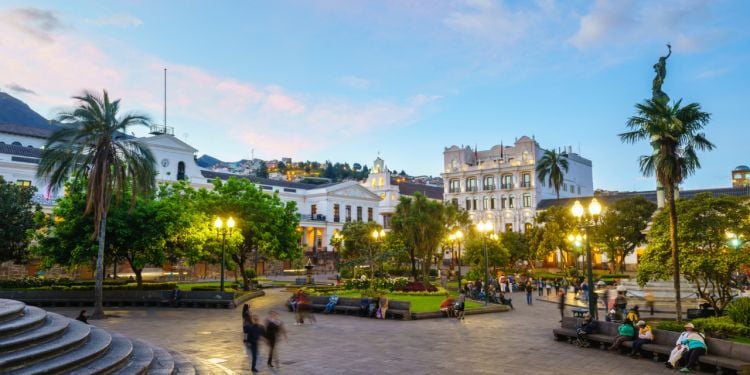Work in Ecuador

Ecuador is famous as a retirement haven. But you might not want to wait until retirement age to move there and enjoy the wonderful advantages of living in Ecuador. In that case, what does it mean to work in Ecuador as an expat? Here's an overview of what you can expect.
An overview of work in Ecuador
At first glance, for most foreigners, salaries appear rather low in Ecuador. Don't let this low wage shock and deter you ' keep in mind that the cost of living is similarly low and that a family can live adequately on a few hundred dollars a month. The minimum wage per month is set at $386 in 2018, which is what an unskilled, uneducated labourer will earn working full time. In addition, employers are required to pay 17.8% of a worker's salary into the Ecuadorian social security scheme, known as the IESS. This payment offers the worker full health insurance coverage (with no copays), access to low-interest loans, and also pays into a retirement fund for the worker. Contracts are initially signed for a trial period of three months, following which they can be renewed each year. Recent government laws protect the worker, requiring the employer to legally contract the employee, pay into IESS, and not be able to fire the worker without paying severance. Even if the worker steals, neglects to show up for work, or even quits, the employer is still required to pay a severance payment. The severance amount depends on how long the employee has been working for the employer, and if the employee was fired or actually quit working. As to work hours in Ecuador, the norm is 40 hours a week with 8 hours daily. The working day can start anywhere from 6 to 10 am and finish 8 to 10 hours later, depending on the type of work and if the employer allows a short or longer lunch time. Employees in the medical field and in public and private schools tend to start and leave work earlier; retail and office workers most often start and leave later.
What's available for expats?
Generally speaking, Ecuador is not the easiest country for an expat to find a job. Although the dollarization to US currency in 2000 stabilized the economy and the unemployment rate has gone from an all-time high of 12.05 % in 2004 to a record low of 5.8 % in 2017, it's still not easy for an expat. Foreigners are required to secure a non-immigrant work visa, but if you have already obtained a permanent resident visa, you are allowed to work in Ecuador and earn a salary. Employment is still more likely to be allotted to locals as a priority, and the recent influx of Venezuelan refugees flooding the working market is affecting not only expats but also Ecuadorians looking for work. However, if you happen to have some form of specialist skills in a field not commonly offered by Ecuadorians themselves, this may work out to everyone's advantage, and your skill may make your job search more productive.
Aim for international companies
Logically, employment oriented towards international business is where you may want to start your search. It is in this area of commerce between the local and foreign that an expat is most likely to find work in Ecuador, and if you are bilingual in Spanish/English or Spanish/Mandarin, you may be luckier than most.
If you're already working for an international company, begin your search by checking to see whether your company has a branch or any activities based in Ecuador. Entering the Ecuadorian work market from this angle entails a whole host of advantages for expatriates, provided they can negotiate their contract carefully. For one thing, the low cost of life in Ecuador clearly works in one's favour when earning a salary aligned with international rates. Conversely, if your company offers you a position but the pay is based on local salaries, you may need to research living expenses in the city of choice in Ecuador, and possibly renegotiate salary details. Retirement plan details with your employer are an additional consideration to take into account if planning to work in Ecuador for a number of years.
If you're not in the aforementioned situation and currently have no work contact or affiliation in Ecuador, attempting to secure a position from abroad could prove arduous, and may be unwise. Sure, in theory, you could find a job online from overseas. However, the happiest and most successful expats seem to have prospected for a job while physically in Ecuador.
Teaching English
Foreign languages constitute the most prolific source of employment for expats in Ecuador. Demand is mostly for English, more recently also for Mandarin, and the basic certification required to teach is the TEFL (Teachers of English as a Foreign Language) certificate. One can make a living earning between $400 - $1500 monthly by teaching English, either in person, at a school, or online. Brick and mortar language schools are mostly located in Quito, Guayaquil, and Cuenca, and schools specializing in business English tend to pay relatively well. With only a Bachelor's degree or TEFL certificate, aim straight for private schools and, with a Master's degree, for universities. Not only can these establishments help with the visa process, they will also offer the best possible pay. Check out what previous teachers have to say about the various schools and locations. Many former teachers have documented their time teaching in Ecuador online, on websites and on personal blogs. The experiences they relate, both positive and negative, can help you make an informed decision.
Check to find out if your government has recommendations about specific schools or if a particular school is affiliated with recognized programs such as the International Baccalaureate, as they also will pay at a higher rate and often will look for native foreign language speakers. In the same vein, translators fluent in Spanish and English are also needed in many businesses. Rather than waiting for an opening and sending in your resume by mail, a suggestion is that you create your own opportunity. Candidates who take the time to visit schools to deliver their CV and apply in person will often find that they have an edge in Ecuador, where the human touch is highly regarded. Consider getting a free CV review at TopCV.
The tourism industry
The tourism industry also yields its fair share of job opportunities for expats. Still very much at that junction between the local and foreign, these jobs revolve largely around language skills ' solid knowledge of Spanish as well as your own native language is a must rather than a plus. Pay is comparatively lower than that of the best English teaching jobs, but accommodation and food often can be included in the job package, potentially balancing out one's budget. Hotels and bars advertise for new staff during high season, June - August, as well as the winter holidays, with late September and October being the low season. Scour the local newspapers online and the omnipresent notice boards at internet cafes, hostales, and laundromats, and make the rounds at hotel reception desks with copies of your CV ready to be given to the managers. The rising demand for tourist guides in jungle areas makes this profession a great bet, too, with eco-tourism now becoming more popular in Ecuador. Unless you aim to be a guide on the Galapagos Islands, for which training and conditions are extremely strict, try your luck at jungle lodges where requirements are more flexible.
Volunteer Work
Finally, remember that work is not only the means of living or making a difference in Ecuador. Some find their reward is in the action of working itself, whether it's paid or not. If what you truly want to do is to experience Ecuador and contribute to the country's development, there is plenty of work for volunteers. Certain organizations can charge a fee for food and accommodation, but others will offer these to you in return for your labour.
Some say you never truly know a person until you've worked with them. The best way to get to know Ecuador might actually be to work in the country.
Useful links:
Work visa requirements, fees and application procedure
Volunteer visa requirements, fees and application procedure
Get your foreign teaching diplomas validated at the Senecyt
Helpful expressions to write a C.V in Spanish
How to write a cover letter in Spanish
Job offers in Ecuador:
Ecuador Explorer
Linkedin
Go Overseas
English teaching schools in Ecuador









